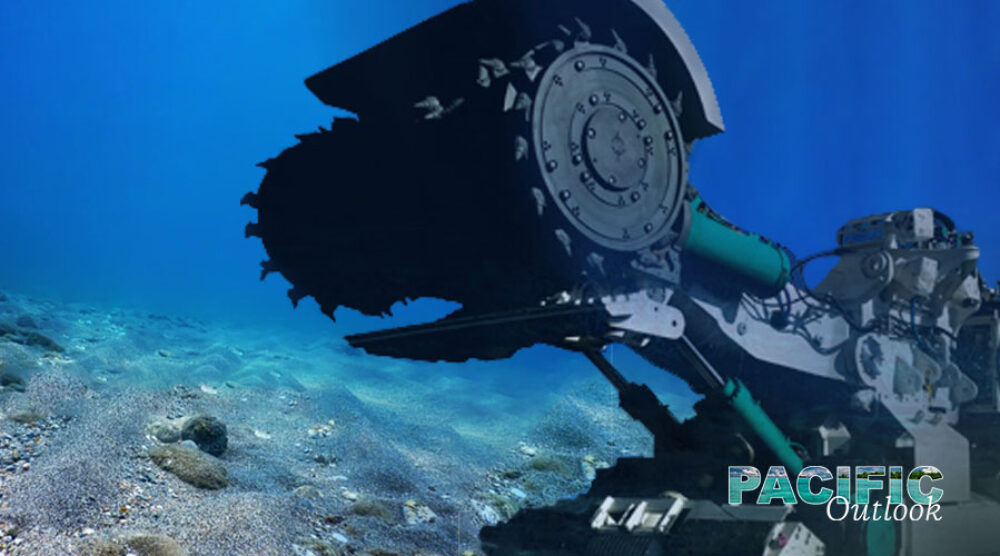Pacific island states have combined custodianship over some of the richest and most extensive Exclusive Economic Zones (EEZs) in the world, totalling 12 million square miles of ocean. The ocean floors of these EEZs are the likely source of minerals essential to the gradual global transition to clean energy. Deep sea mining (DSM), a frontier industry, may become a reality for some Pacific island states. DSM can be characterised as involving “a range of practices including the exploration, extraction, transportation, and processing of minerals retrieved from the ocean floor and transiting through the water column to the surface”.
The impacts of DSM on national and collective governance and diplomacy are explored in a Regional Outlook paper released by the Griffith Pacific Hub today.
With these vast EEZs, Pacific island states are already demonstrating the ability to leverage agendas on matters of ocean governance. For instance, in early September 2022, Nauru sponsored the Nauru Ocean Resources Inc., (NORI), a subsidiary of Canadian-owned The Metals Company to undertake exploration, with a possible exploitation licence to be granted in 2023, if approved by the International Seabed Authority (ISA). On the flip side, national interest for control over sovereign decisions can frustrate any collective commitments to regional agendas such as sustainable ocean management. There are two areas where regulatory mechanisms will apply in any foreseeable DSM project. Firstly, in the Area, or sea beds of oceans designated as international waters. Regulatory mandate of the Area is exercised by the ISA. Secondly, on the sea beds of territorial waters of the domestic Exclusive Economic Zones (EEZs) of states, where national legislation and regulations are applicable.
Although there are many uncertainties about the likely impact of DSM on the ocean environment, some Pacific island states have already started sponsoring exploration and mining licenses to contractors for DSM projects. Pacific island states such as Nauru, Tonga, Kiribati and Cook Islands are some of the first state sponsors for exploration permits to the Clarion-Clipperton Fracture Zone (CCFZ), a highly lucrative Area where seabed mineral wealth has been surveyed. The CCFZ is situated in the central Pacific Ocean, east of Kiribati.
DSM has the likelihood of complicating regional commitments by Pacific island leaders to ocean sustainability. The diplomatic process of reconciling national interests with regional commitments will therefore be at the heart of the DSM issue in the region. Regardless of the uncertainties, the last decade has seen preparation towards a whole range of domestic legislation and policy frameworks for Pacific states.
From 2011 to 2016, the Secretariat of the Pacific Community’s (SPC) Applied Geoscience and Technology Division implemented the Deep Sea Minerals Project. The project was a joint initiative between the SPC and the European Union, with the stated objective to provide “technical advice and assistance to enable the 15 member countries to make informed decisions about deep sea mining within their national jurisdictions”. In the Pacific Forum Leaders’ Meeting in Rarotonga in August 2012, the Regional Legislative and Regulatory Framework (RLRF) was launched and endorsed by all 15 participating member states from the Pacific Islands Forum. Described as a “world first”, the RLRF guides “countries to develop the national law and policy frameworks needed to improve the management of their marine mineral resources”.
Through the Deep Sea Minerals Project Cook Islands, Federated States of Micronesia, Fiji, Niue, Republic of Marshall Islands, Tuvalu and Tonga were able to review existing legislation and policies or enact legislation to undertake DSM.
Understandably, the preparatory work towards DSM has exclusively been directed at the bureaucratic and legislative echelons of decision-making for countries in the Pacific. The unintended consequence is that it may have been at the expense of holistic domestic consultations within and across all island communities. Because of the top-down nature of DSM planning, there has not been any thorough consultative process to assess the receptiveness of Pacific islanders to DSM. The whole premise of regional frameworks such as the 2050 Strategy for the Blue Pacific Continent has been about the peoples of the Pacific and their aspirations. DSM has proven a controversial subject matter because it seems to have bypassed the engagement of informed Pacific islanders. The credibility and sense of ownership of regional frameworks in the eyes of Pacific islanders must be given effect by the leaders who sign up to these frameworks.
A possible middle-ground approach in the diplomatic process in the region is the 10-year moratorium. Pacific island states can utilise the moratorium period to address regional concerns, domestic capacity, and renewed consultations, as well as promote ocean scientific research. The moratorium can also allow breathing space to rework a collective framework for a resource benefit/cost-sharing arrangement. Hon. Ralph Regenvanu (currently the Minister for Climate Change in Vanuatu) suggested “a regional approach to deep sea mining, a regional governance mechanism, regional regulations”. Pacific island states cannot act single-handedly on DSM. A regional coalition of sponsoring States can collectively act and use their power in numbers to deal with contractors and other DSM players.
Patrick Kaiku is a lecturer in Political Science at the University of Papua New Guinea and a Non-Resident Fellow at the Griffith Asia Institute.








